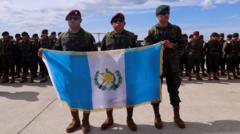Guatemala has deployed a group of 150 soldiers to Haiti amid a surge of gang violence and chaos in the capital, Port-au-Prince. The deployment, which includes two groups of 75 soldiers arriving on consecutive days, aims to bolster a United Nations-backed security mission led by Kenya. The decision comes as Haitian authorities grapple with violent armed gangs that have assumed control over significant portions of the city, exacerbating the ongoing humanitarian crisis.
The soldiers are drawn from Guatemala's military police force and are part of a larger UN-sanctioned international effort, expected to comprise about 2,500 personnel from multiple nations. This number follows the arrival of nearly 400 police officers from Kenya, who were deployed last year but have struggled to curb the escalating violence. Additional troops from Jamaica, Belize, and El Salvador have also contributed to the mission, while the United States supports the initiative financially.
Haiti's situation has become increasingly dire, marked by chronic poverty and systemic instability. With a history of dictatorship and natural disasters, the nation has faced significant challenges in recent decades. The assassination of President Jovenel Moïse in July 2021 further plunged the country into a deeper level of chaos, leading to the erosion of political control and a rise in gang warfare.
The situation worsened in March 2024 when armed gangs orchestrated an attack on Haiti’s two largest prisons, freeing approximately 3,700 inmates into an already tense environment. Compounding the problem, a state of emergency has been enforced across Haiti since early March due to increased violence, particularly in the Ouest Department, which includes the capital.
As international forces work together, the hope is that their collective efforts can rein in the rampant gang activity and pave the way for stability in this impoverished nation that is grappling with its darkest period yet.
The soldiers are drawn from Guatemala's military police force and are part of a larger UN-sanctioned international effort, expected to comprise about 2,500 personnel from multiple nations. This number follows the arrival of nearly 400 police officers from Kenya, who were deployed last year but have struggled to curb the escalating violence. Additional troops from Jamaica, Belize, and El Salvador have also contributed to the mission, while the United States supports the initiative financially.
Haiti's situation has become increasingly dire, marked by chronic poverty and systemic instability. With a history of dictatorship and natural disasters, the nation has faced significant challenges in recent decades. The assassination of President Jovenel Moïse in July 2021 further plunged the country into a deeper level of chaos, leading to the erosion of political control and a rise in gang warfare.
The situation worsened in March 2024 when armed gangs orchestrated an attack on Haiti’s two largest prisons, freeing approximately 3,700 inmates into an already tense environment. Compounding the problem, a state of emergency has been enforced across Haiti since early March due to increased violence, particularly in the Ouest Department, which includes the capital.
As international forces work together, the hope is that their collective efforts can rein in the rampant gang activity and pave the way for stability in this impoverished nation that is grappling with its darkest period yet.




















